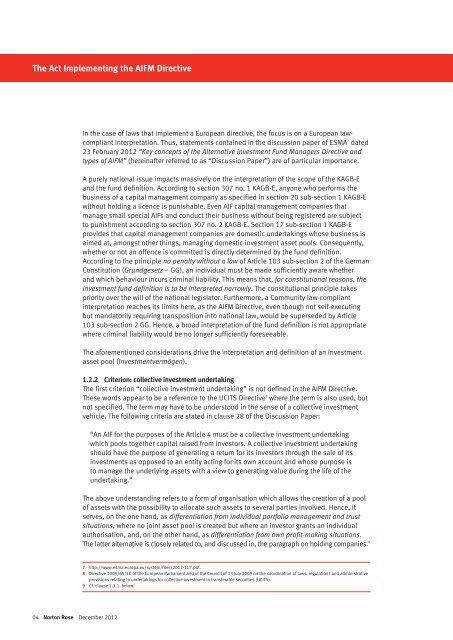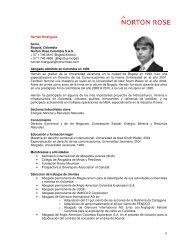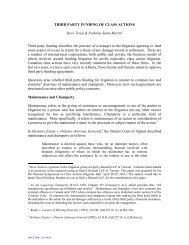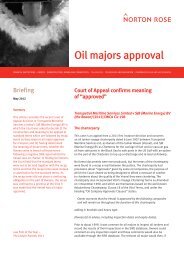The Act Implementing the AIFM Directive - Norton Rose
The Act Implementing the AIFM Directive - Norton Rose
The Act Implementing the AIFM Directive - Norton Rose
Create successful ePaper yourself
Turn your PDF publications into a flip-book with our unique Google optimized e-Paper software.
<strong>The</strong> <strong>Act</strong> <strong>Implementing</strong> <strong>the</strong> <strong>AIFM</strong> <strong>Directive</strong><br />
04 <strong>Norton</strong> <strong>Rose</strong> December 2012<br />
In <strong>the</strong> case of laws that implement a European directive, <strong>the</strong> focus is on a European lawcompliant<br />
interpretation. Thus, statements contained in <strong>the</strong> discussion paper of ESMA 7 dated<br />
23 February 2012 “Key concepts of <strong>the</strong> Alternative Investment Fund Managers <strong>Directive</strong> and<br />
types of <strong>AIFM</strong>” (hereinafter referred to as “Discussion Paper”) are of particular importance.<br />
A purely national issue impacts massively on <strong>the</strong> interpretation of <strong>the</strong> scope of <strong>the</strong> KAGB-E<br />
and <strong>the</strong> fund definition. According to section 307 no. 1 KAGB-E, anyone who performs <strong>the</strong><br />
business of a capital management company as specified in section 20 sub-section 1 KAGB-E<br />
without holding a licence is punishable. Even AIF capital management companies that<br />
manage small special AIFs and conduct <strong>the</strong>ir business without being registered are subject<br />
to punishment according to section 307 no. 2 KAGB-E. Section 17 sub-section 1 KAGB-E<br />
provides that capital management companies are domestic undertakings whose business is<br />
aimed at, amongst o<strong>the</strong>r things, managing domestic investment asset pools. Consequently,<br />
whe<strong>the</strong>r or not an offence is committed is directly determined by <strong>the</strong> fund definition.<br />
According to <strong>the</strong> principle no penalty without a law of Article 103 sub-section 2 of <strong>the</strong> German<br />
Constitution (Grundgesetz – GG), an individual must be made sufficiently aware whe<strong>the</strong>r<br />
and which behaviour incurs criminal liability. This means that, for constitutional reasons, <strong>the</strong><br />
investment fund definition is to be interpreted narrowly. <strong>The</strong> constitutional principle takes<br />
priority over <strong>the</strong> will of <strong>the</strong> national legislator. Fur<strong>the</strong>rmore, a Community law-compliant<br />
interpretation reaches its limits here, as <strong>the</strong> <strong>AIFM</strong> <strong>Directive</strong>, even though not self-executing<br />
but mandatorily requiring transposition into national law, would be superseded by Article<br />
103 sub-section 2 GG. Hence, a broad interpretation of <strong>the</strong> fund definition is not appropriate<br />
where criminal liability would be no longer sufficiently foreseeable.<br />
<strong>The</strong> aforementioned considerations drive <strong>the</strong> interpretation and definition of an investment<br />
asset pool (Investmentvermögen).<br />
1.2.2 Criterion: collective investment undertaking<br />
<strong>The</strong> first criterion “collective investment undertaking” is not defined in <strong>the</strong> <strong>AIFM</strong> <strong>Directive</strong>.<br />
<strong>The</strong>se words appear to be a reference to <strong>the</strong> UCITS <strong>Directive</strong> 8 where <strong>the</strong> term is also used, but<br />
not specified. <strong>The</strong> term may have to be understood in <strong>the</strong> sense of a collective investment<br />
vehicle. <strong>The</strong> following criteria are stated in clause 28 of <strong>the</strong> Discussion Paper:<br />
“An AIF for <strong>the</strong> purposes of <strong>the</strong> Article 4 must be a collective investment undertaking<br />
which pools toge<strong>the</strong>r capital raised from investors. A collective investment undertaking<br />
should have <strong>the</strong> purpose of generating a return for its investors through <strong>the</strong> sale of its<br />
investments as opposed to an entity acting for its own account and whose purpose is<br />
to manage <strong>the</strong> underlying assets with a view to generating value during <strong>the</strong> life of <strong>the</strong><br />
undertaking.”<br />
<strong>The</strong> above understanding refers to a form of organisation which allows <strong>the</strong> creation of a pool<br />
of assets with <strong>the</strong> possibility to allocate such assets to several parties involved. Hence, it<br />
serves, on <strong>the</strong> one hand, as differentiation from individual portfolio management and trust<br />
situations, where no joint asset pool is created but where an investor grants an individual<br />
authorisation, and, on <strong>the</strong> o<strong>the</strong>r hand, as differentiation from own profit-making situations.<br />
<strong>The</strong> latter alternative is closely related to, and discussed in, <strong>the</strong> paragraph on holding companies. 9<br />
7 http://www.esma.europa.eu/system/files/2012-117.pdf.<br />
8 <strong>Directive</strong> 2009/65/EC of <strong>the</strong> European Parliament and of <strong>the</strong> Council of 13 July 2009 on <strong>the</strong> coordination of laws, regulations and administrative<br />
provisions relating to undertakings for collective investment in transferable securities (UCITS).<br />
9 Cf. clause 1.3.1. below.













